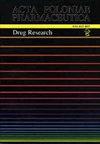Community pharmacist-driven interventions in COPD: improving knowledge, attitude and health status
IF 0.4
4区 医学
Q4 PHARMACOLOGY & PHARMACY
引用次数: 0
Abstract
Background: COPD is a chronic condition requiring care from a multidisciplinary team in which pharmacists play an important role. Aim: We aimed to evaluate the impact of structured pharmacist-patient counseling on patient’s knowledge, attitudes about medicines and the impact of COPD on patients’ health status. Methods: A prospective study was conducted in ten community pharmacies. Patients were counseled using detailed approach after completing validated questionnaires. The patients returned to a pharmacy for a follow-up after three months. Four validated questionnaires have been used to assess different aspects of patient’s knowledge about the disease, their attitudes about medicines and the impact of disease on patients’ health status: COPD Assessment Test (CAT), Modified Medical Research Council Dyspnea Scale (mMRC), Bristol COPD Knowledge Questionnaire (BCKQ), and The Beliefs about Medicines Questionnaire (BMQ). Results: Pharmacists recruited 83 COPD patients, from which 73 patients attended a follow-up visit. Before pharmacist intervention, the CAT median score was 20. After counseling, the CAT score decreased to 18 (p<0.05). The highest improvement in patient’s knowledge was observed for inhaled bronchodilators (28.2%), vaccination (25.8%), oral steroids (24.4%), and smoking (24.2%). The median score for necessity increased, whereas the harm and concern median scores considerably decreased (p<0.05). Conclusion: The results showed significant improvements in all aspects covered throughout pharmacist-patient counseling. Based on our results, proactive role of the pharmacist in the care of COPD patients may be beneficial to patients, to physicians and to healthcare: improving care, alleviating the strain on overloaded doctors with containing the costs.社区药剂师驱动的COPD干预:改善知识、态度和健康状况
背景:慢性阻塞性肺病是一种慢性疾病,需要多学科团队的护理,药剂师在其中发挥着重要作用。目的:我们旨在评估结构化药剂师患者咨询对患者对药物的知识、态度的影响,以及COPD对患者健康状况的影响。方法:对10家社区药店进行前瞻性研究。患者在完成经验证的问卷调查后,采用详细的方法进行咨询。患者在三个月后返回药房进行随访。四份经过验证的问卷被用于评估患者对疾病的知识、他们对药物的态度以及疾病对患者健康状况的影响的不同方面:COPD评估测试(CAT)、改良医学研究委员会呼吸困难量表(mMRC)、Bristol COPD知识问卷(BCKQ),结果:药剂师招募了83名COPD患者,其中73名患者进行了随访。在药剂师干预之前,CAT中位得分为20。咨询后,CAT评分降至18分(p<0.05)。吸入支气管扩张剂(28.2%)、接种疫苗(25.8%)、口服类固醇(24.4%)和吸烟(24.2%)对患者知识的改善最高。必要性的中位评分增加,而伤害和关注中位得分显著降低(p<0.05)。结论:结果表明,在整个药剂师-患者咨询过程中,各方面都有显著改善。根据我们的研究结果,药剂师在COPD患者护理中的积极作用可能对患者、医生和医疗保健有益:改善护理,通过控制成本减轻超负荷医生的压力。
本文章由计算机程序翻译,如有差异,请以英文原文为准。
求助全文
约1分钟内获得全文
求助全文
来源期刊
CiteScore
0.80
自引率
0.00%
发文量
74
审稿时长
6-12 weeks
期刊介绍:
The international journal of the Polish Pharmaceutical Society is published in 6 issues a year. The journal offers Open Access publication of original research papers, short communications and reviews written in English, in all areas of pharmaceutical sciences. The following areas of pharmaceutical sciences are covered: Analysis, Biopharmacy, Drug Biochemistry, Drug Synthesis, Natural Drugs, Pharmaceutical Technology, Pharmacology and General.
A bimonthly appearing in English since 1994, which continues “Acta Poloniae Pharmaceutica”, whose first issue appeared in December 1937. The war halted the activity of the journal’s creators. Issuance of “Acta Poloniae Pharmaceutica” was resumed in 1947. From 1947 the journal appeared irregularly, initially as a quarterly, then a bimonthly. In the years 1963 – 1973 alongside the Polish version appeared the English edition of the journal. Starting from 1974 only works in English are published in the journal. Since 1995 the journal has been appearing very regularly in two-month intervals (six books a year). The journal publishes original works from all fields of pharmacy, summaries of postdoctoral dissertations and laboratory notes.

 求助内容:
求助内容: 应助结果提醒方式:
应助结果提醒方式:


